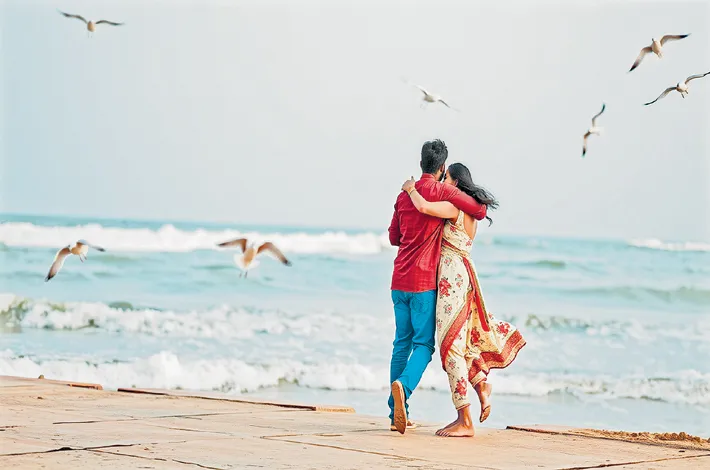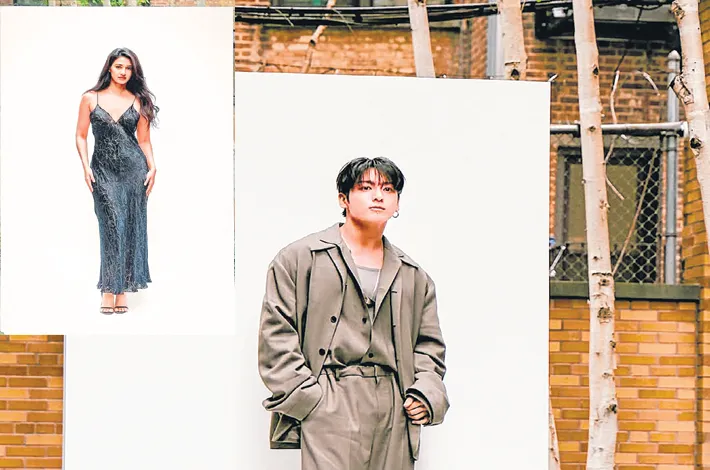Love in Pondicherry
25-08-2025 12:00:00 AM

The salty breeze of Pondicherry’s Promenade Beach carried the scent of rain as monsoon clouds loomed over the Bay of Bengal. Anjali stood under the canopy of a small café along the Rock Beach, her cotton saree fluttering in the wind. She was a painter, drawn to this coastal town for its vibrant hues—ochre French colonial buildings, turquoise waves, and the golden glow of Aurobindo Ashram. At 28, she had come to Pondicherry seeking inspiration, but what she found was something far deeper.
Across the café, Vikram sat at a corner table, his laptop open but untouched. A writer from Delhi, he was in Pondicherry to escape the chaos of city life and finish his novel. His dark eyes, framed by unruly curls, caught Anjali’s glance as she sipped her filter coffee. He smiled—a shy, hesitant curve of lips—and she felt a warmth unrelated to the steaming cup in her hands.
The first raindrops fell, scattering tourists and locals alike. Anjali, however, stayed, sketching the blurred outlines of fishing boats bobbing in the distance. Vikram noticed her focus, the way her pencil danced across the page, undeterred by the drizzle. He gathered his courage, closed his laptop, and approached her table.
“Mind if I join you?” he asked, gesturing to the empty chair. “This rain doesn’t seem to be stopping anytime soon.”
Anjali looked up, her eyes bright with curiosity. “Only if you don’t mind a bit of charcoal smudging your writerly aesthetic,” she teased, nodding at her sketchpad.
He laughed, and that was the beginning.
Over the next week, they found themselves drawn together, as if Pondicherry’s narrow, flower-lined streets conspired to keep them close. They wandered through the French Quarter, where bougainvillea spilled over pastel walls, and shared stories at Café des Arts, its yellow shutters framing their growing connection. Anjali spoke of her love for capturing fleeting moments on canvas—sunsets, street vendors, the flicker of a temple lamp. Vikram, in turn, revealed how words were his way of making sense of a world that often felt too heavy.
One evening, they walked to Serenity Beach, the sand cool beneath their feet. The monsoon had paused, leaving the sky a bruised purple. Vikram stopped to pick up a seashell, its spiral worn smooth by the tide. “This is you,” he said, holding it out to Anjali. “Beautiful, intricate, shaped by time and the sea.”
She blushed, tucking the shell into her pocket. “And you’re like this beach,” she replied. “Calm on the surface, but with stories hidden in every grain of sand.”
Their days became a rhythm of shared silences and stolen glances. They visited Auroville, where the golden Matrimandir glowed under a stormy sky, and Anjali sketched while Vikram read aloud from his manuscript. His novel, a tale of love and loss set in a fictional coastal town, began to weave in details of Pondicherry—the creak of a bicycle, the scent of jasmine, the way Anjali’s laughter echoed like temple bells.
But love, like the monsoon, was unpredictable. Anjali’s residency at an art collective was ending, and her return to Chennai loomed. Vikram, too, faced a deadline to submit his manuscript and return to Delhi. Neither spoke of the inevitable, but it hung between them like the humidity before a storm.
One night, as rain lashed the Promenade, they took shelter in a small bookstore on Rue de la Marine. The shop was a labyrinth of dusty tomes and flickering lamps, its owner an old Tamil man who hummed Carnatic music. Anjali found a book of Rumi’s poetry and read a line aloud: “Lovers don’t finally meet somewhere. They’re in each other all along.”
Vikram looked at her, his heart pounding. “Do you believe that?” he asked.
She met his gaze, her voice soft. “I’m starting to.”
The next day, they sat at Paradise Beach, reached by a boat ride through mangrove-lined waters. The rain had cleared, and the sun painted the waves gold. Anjali’s sketchpad lay forgotten as she leaned against Vikram, their fingers intertwined. “What happens when we leave?” she asked, her voice barely above the crash of waves.
Vikram was quiet for a moment, then said, “We carry this with us. Pondicherry, the rain, us—it’s not just a place or a moment. It’s a story we’re writing together.”
She turned to him, her eyes searching. “But stories end, Vikram.”
“Not ours,” he said, his voice steady. “We’ll find a way.”
The day before Anjali’s departure, they visited the Basilica of the Sacred Heart, its Gothic spires piercing the sky. Inside, the stained-glass windows cast a kaleidoscope of colors across the pews. Anjali lit a candle, her fingers trembling. “For us,” she whispered.
Vikram took her hand. “For us,” he echoed.
That night, under the stars at Goubert Avenue, they made a promise. Anjali would return to Pondicherry in three months, after her exhibition in Chennai. Vikram would stay, polishing his novel, weaving their love into its pages. They would write letters—not emails, but handwritten notes, sent by post, carrying the scent of Pondicherry’s salt and rain.
As Anjali boarded her bus to Chennai, Vikram pressed the seashell into her palm. “Keep this,” he said. “It’s a reminder that we’re not done.”
She smiled through tears. “Write me into your story, Vikram.”
“You’re already the best part,” he replied.
Three months later, Anjali stepped off the bus at Pondicherry’s station, her heart racing. The town was the same—vibrant, alive, kissed by the sea—but now it held something more. Vikram waited at the Promenade, his novel finished, its dedication reading: To Anjali, my muse, my monsoon.
They ran to each other, the distance between Chennai and Delhi collapsing in a single embrace. The waves roared, the gulls cried, and Pondicherry, with its colorful streets and whispering tides, bore witness to a love that refused to end.








